Biography of Jacques, Jacob, André, Rebboah
–
–
–
–
–
–
–
–
–
–
Jacques Jacob André Rebboah was born on January 8 in Lyon, France. He lived at 5, quai de la Bibliothèque, in the 5th district, with his parents Henri Aaron Rebboah (born November 14 1883 in Mostaganem, in the Oran department of Algeria) and Anna Rebboah, née Benaïm, (born July 25 1887 in Relizane, in the Oran department of Algeria) along with his youngest brother Prosper Rebboah (father of Muriel and Jean-Jacques, the authors of this biography).
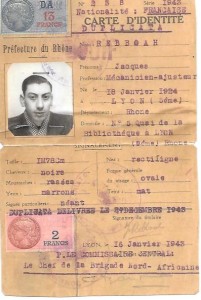
Jacques had three brothers:
Maurice Rebboah, born July 14, 1913 in Relizane, in the Oran department of Algeria.
Victor Rebboah, born November 11, 1918 in Relizane, in the Oran department of Algeria.
Prosper Rebboah, born July 10 in Lyon, in the 5th district.
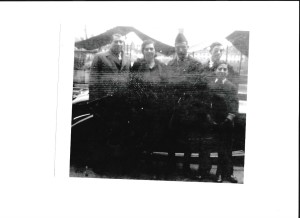
A family photo of Aaron, Anna, Victor, Jacques and Prosper
In 1944, when events came to a head for Jacques, his two brothers were destined for different futures:
Maurice, the eldest, had been taken prisoner by the Germans in 1940 and detained ever since.
Victor, who was married, lived with his wife Jeannette and their little boy, Gilles, in Grenoble, in the Isère department.
On the morning of July 1, 1944, Jacques was to go to the funeral of a colleague from the factory where he worked. The man was a worker who had been killed one night by a German patrol when he was on his way to go fishing after the curfew. Jacques undoubtedly felt it a matter of honor to pay this final tribute to his comrade. The incident had caused a great stir at their workplace and there were fears that things would become heated. Let’s not forget that the Allied landing had just only recently taken place, on 6 June, and a “wind of liberation” was blowing over occupied France.
Aware of the potential danger, his mother Anna had been careful not to wake her son that morning. However, when a brother-in-law of our grandparents came to visit, the sound of the doorbell startled Jacques, who rushed out so as not to be late for the ceremony.
It was while returning from this funeral that he was arrested, on rue de la Barre, by Touvier’s militiamen, who were making an increasing number of arrests throughout the region. It is important to note here that on June 28, 1944, a Resistance commando had shot dead Philippe Henriot (the Vichy regime’s Secretary of State for Information and Propaganda and also a sinister member of the militia).
Jacques’ mother was informed of her son’s arrest by Georgette Zerbib, a young girl who helped her with the housework.
His father and his brother Victor, who was himself wanted by the militia and had left Grenoble with his family to seek refuge in Lyon, were together at 13, Rue Emile Zola, where Aaron Rebboah had a shoe-repair shop.
The Gestapo headquarters was at 32, Place Bellecour, just a stone’s throw from the store. It was there that Jacques was taken, as were all the other people arrested by the militiamen.
The end of the war was approaching and the highly active Lyon militiamen were intensifying their operations. At the same time, they were beginning to organize the rearguard in preparation for an imminent escape. It was probably with this in mind that one of the militiaman suggested that Jacques take him to his parents’ store (most likely in secret) to try to extract some money from them.
It was there that Aaron and Victor saw Jacques arrive with the plainclothes militiaman (whose identity the family were never to discover!!!) who asked them for money.
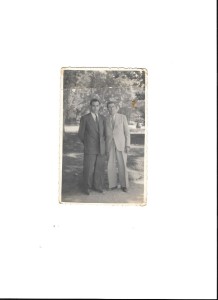
Aaron and Victor
Of course, Aaron didn’t have enough money at the time, so he suggested that he get some later and then exchange his son for the “ransom” demanded. Our uncle Victor, a tough non-commissioned infantry officer, surreptitiously suggested to his father that he lure the policeman into the attic/out to the porch/shelter where he himself would deal with him with one of the shoemaker’s punches. However, the venture proved impractical and was swiftly abandoned.
Jacques asked if he could have something to eat and Mr Jean Blanpain, who owned a liquor store at 15, rue Emile ZOLA, was asked to provide a snack (we were able to find a copy of his testimony dated November 22, 1950 as part of an investigation undertaken after the war).
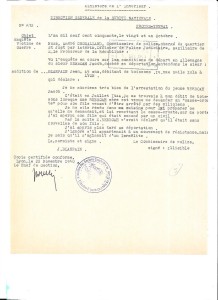
The whole family then left Lyon in a hurry. Jacques’ father, Aaron, was able to take his family to safety in a house located in Saint-Génis les Ollières in the Rhone department, where he had rented a small apartment from a Mr and Mrs Riberon, a couple who were laundry workers and people they could trust.
So there they all stayed until the liberation of Lyon:
His wife Anna, his young son Prosper, his son Victor with his wife Jeannette, his daughter Yvette and their son Gilles. They were soon joined by Esther, Aaron’s sister, accompanied by her husband Emile Cohen. The day after Jacques’ arrest, the militia went to the family home at 5, quai de la Bibliothèque (since renamed quai Romain Rolland). The Crassard sisters, who were their neighbors on the same landing, would later tell Aaron and Anna that the militiamen had forced the heavy front door with “heavy blows of rifle butts” and looted the apartment and then, afterwards, the store on rue Emile ZOLA.
As for Jacques, he was taken to Fort Montluc in Lyon (a sadly famous prison where Jean Moulin, among others, was imprisoned under the false name of…Jacques Martel…until his cover was blown!!!)
Our uncle Jacques remained in detention until July 21, 1944, when he was sent to DRANCY.
From Drancy, he was deported on July 31, 1944 in convoy 77 and arrived at AUSCHWITZ on August 2, 1944 (registration number B 3890). Convoy 77 was the last to leave Drancy for Auschwitz. The Nazi commander Aloïs BRUNNER in his rage of murderous madness had no hesitation in stopping trains carrying German reinforcements towards the Normandy front in order to give first priority to his death train. He had made every effort, for this last convoy, to gather together over 1,300 people, including 300 children (the youngest was barely 3 weeks old!!!!).
After much research it was in 1945 that Aaron, our grandfather, received the official death certificate of his son, Jacques, who died on October 29, 1944 in Auschwitz.
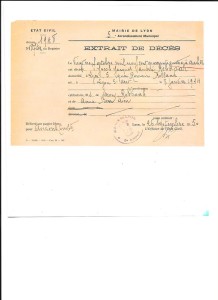
For 73 years, this date of 29 October 1944 remained the last thing we knew of this sad life story.
This fact was confirmed, moreover, by the J.O.R.F (Journal Officiel de la République Française – Official Journal of the French Republicl) n° 57 of 8 March 1997 (page 3684), which confirmed the death of Jacques Rebboah (born 08/01/24 in Lyon, department 69) on 29 October 1944 in Auschwitz[1].
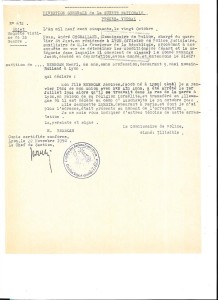
However, HISTORY is truly cruel and full of morbid surprises!
On July 31, 2014 for the commemoration of the 70th anniversary of convoy 77 at the SHOAH memorial in Paris we (Muriel, Jean-Jacques, Philippe, Corinne and Jocelyne) accompanied our father Prosper REBBOAH, who wanted to pay a final tribute to Jacques. The entire list of names of the convoy 77 deportees was read out in alphabetical order by various people, including a few survivors whom we (at last!) have been able to get to know.
It was then that we met Georges MAYER, whose father was on convoy 77. He was the one who, with so much energy and courage, initiated the convoy 77 association, and I, Muriel Nemoz, née Rebboah, am now on its board of directors. It is thanks to Georges MAYER that we decided to gather as many documents as possible concerning the members of this convoy and to compile as complete a biography as possible for each of them.
And it was from there that my brother Jean-Jacques and I began to work on putting together our file.
With this in mind, on April 11, 2017, taking advantage of a family reunion to celebrate Passover, the Jewish Easter, Jean-Jacques said to me: “let’s search the net” to help compile the biography of our uncle by simply entering the words “Jacques Rebboah deportee”.
Several results appeared immediately, including a title in German “Die Häftlinge des DZ AuBenlagers Hailfingen/Tailfingen de Volker Mall”. For us, of course, this German text was utterly incomprehensible, but the summary that appeared under the link caught our attention with the words “…exhumation and repatriation of the body of…Jacques Rebboah, who died on 11-4-45 in Speyer…”.
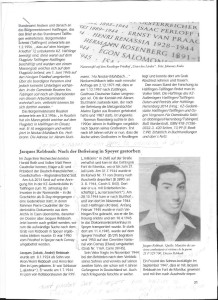
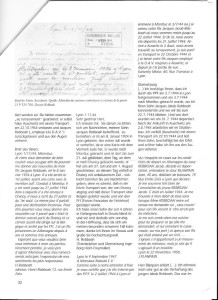
Who was it about??? Another person of the same name???
We clicked again to retrieve the entire text, which we scrolled down without really understanding it since it was written almost entirely in German.
There was a complete list of names in alphabetical order with an explanatory note that seemed to tell the story of each person. The dates and town or city names were given in German and sometimes in French. We continued to scroll down and when we arrived at Jacques Rebboah we cried out in surprise as a photo of our uncle appeared unexpectedly. That same photo, the one we knew so well, the photo taken a few months before his arrest, in his 20th year: it really was HIM !!!
In addition, the short text in French and the dates matched those of Jacques “…born on 08/01/1924 in Lyon, address 5, quai de la Bibliothèque ” but why did it say “died on 11-4-45 in Speyer” and “body repatriated”???
Here, then, is the continuation of his story that we did not know until then:
On 28 October 1944 he was transferred to the Stutthof camp (in Poland, near Danzig, now Gdansk).
In November1944, he was transferred to Hailfingen (registration number 40,866).
In early February 1945 he was sent to the Vaihingen/Enz camp
On April 7, 1945, the 1st French Army liberated this concentration camp. The French soldiers discovered the horrors of that it held.
Jacques lived through the liberation of the camp but he was very sick (with typhus). He was sent to the Diaconesses hospital in Speyer where, unfortunately, he died on April 11, 1945 and was then buried in Speyer cemetery. In 1950, at the request of the French authorities, his remains were exhumed and moved to the Cernay French Military Cemetery in the province of Alsace. It is here that he now lies, in area 39/45, grave N° 1169.
On his headstone are the words:
REBBOAH Jacques
D.P.
MORT POUR LA FRANCE LE 11-4-1945
(Died for France on 11.4.1945)
Yes, HISTORY is facetious in more ways than one: it is as if the past intertwines with the present with disconcerting persistence!!!!!
Our father, Prosper Rebboah, the last surviving sibling, passed away on September 20, 2014 and the book by Volker Mall and Harald Roth, so full of information would be published in…November 2014. In it, we also discover the stories of 60 other deportees from convoy 77.
Moreover, it is through this book that we learned that Jacques had been buried in the cemetery at Cernay. Our father often went to nearby Haguenau, where the headquarters of his employer, the company Roos, was located.
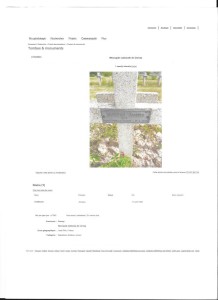
Better still: why did we discover this astonishing information “died on 11-4-1945” on exactly 11-4-2017, that being 72 years to the day after his death?!! On this first evening of Passover, to mark the occasion, we put the pictures of Prosper and James with us at the table as if they themselves were asking to stay among us… as if they wanted to tell us: “Carry on with your lives because OUR story is not over!!”.
This biography was written by me Muriel Nemoz, née Rebboah, and my brother Jean-Jacques Rebboah. We wanted to base it on as many documents as possible in order to determine as accurately as possible the reality of what happened.
We were able to obtain many documents thanks to the copy of file N° 21 P 529 700 on Jacob Jacques André Rebboah, which the CAEN archive center of the Ministry of Veterans Affairs kindly sent us.
We would like to thank Mr Volker Mall and Mr Harald Roth for their excellent research work, which enabled us to learn, at long last, a whole chapter in the history of our uncle’s life that our family had been completely unaware of up to now.
We would like to thank Georges Mayer in particular, for his skill in gathering an entire team around him to undertake a very valuable commemorative project, which is so essential in this day and age.
We do feel, however, a sense of bitterness on reading an official letter, dated February 7, 1951, which makes it clear that the information network failed.
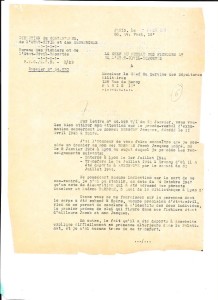
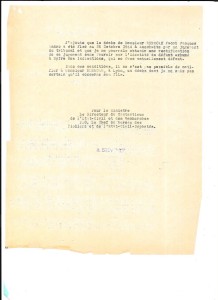
In effect, by playing with words, the writer of this document proves that he closed the file a little too hastily in concluding: “under these circumstances, it is not possible for me to notify Mr REBBOAH, in Lyon, of a death that I am not sure concerns his son.”
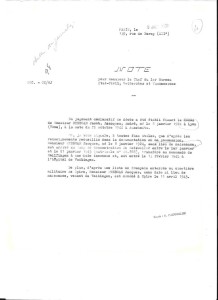
Yet this concerned our uncle’s entire odyssey, from October 28, 1944 at Auschwitz, to his death on April 11, 1945, and then, later on, to his grave in a French national cemetery.
Through his remarkable incompetence this “bureaucrat” deprived an entire family of the TRUTH about the fate of their son and brother: they never knew that he had died a free man.
My brother Jean-Jacques and I were children at the end of the 1950s, but we still have vivid recollections of our grandparents’ silent grief.
When she was minding us in her home, our grandmother pampered us and in her big bed she told us the story of a wonderful boy we had never known. She carefully brought out childhood notebooks containing splendid and almost unreal drawings that fascinated us and made us dream. What a pleasant life he must have had. We didn’t understand the whole story but still we felt, in the tenderness of Anna’s words, that there was something magical about it. Now we know and we keep these famous notebooks like precious treasure.
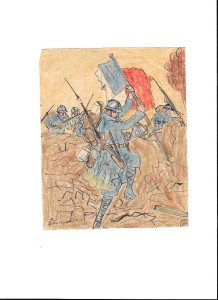
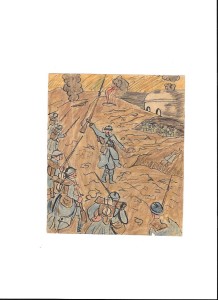
As for our grandfather, he intrigued us a lot because he was so odd. He would mysteriously lead us in front of a big mirror, ask us to talk to the man in the mirror and try to persuade him to hand something or someone back to him and then he would try to slip banknotes under the mirror!!! It made us laugh very hard, but it also scared us a bit, because we didn’t really understand this old grandfather of ours.
Aaron died, having lost his mind over reliving this devastating obsession. It was later, of course, that we understood that he had never been able to admit that a French “policeman” had kidnapped his son from right under his nose and that he, a true patriot and 14-18 veteran, could do nothing about it!
Today we understand only too well this terrible pain of separation from a loved one and we imagine the LOVE that united this family with a delightful “BEFORE” and a repugnant “AFTER”.
To conclude, we would like to quote the testimony dated September 26, 1950 of J. Korchez, who was interned in Montluc prison with Jacques. He wrote: “Your son Jacques was my fellow prisoner in Montluc and in Drancy and he often talked to me about you. Unfortunately, like most of my companions, he did not return from the Nazi camps.
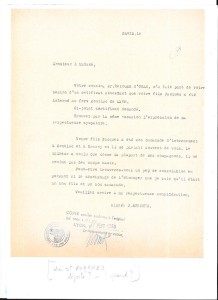
Perhaps you will find some consolation, in thinking of the testimony of the stranger that I am, that he was a good son and a good comrade.”
It now seems certain to us that Jacques found the strength to hold on, during these long months of slavery, to the sole prospect of seeing his own again one day… and he almost succeeded!!!
To close, here are the photos of Jacques and Raphael Caraco, now displayed on the staircase of Vahingen town hall.
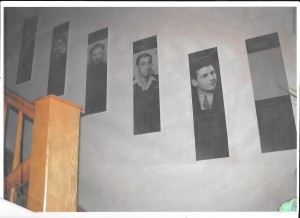
and there is also a picture of Jacques’ parents, Anna and Aaron
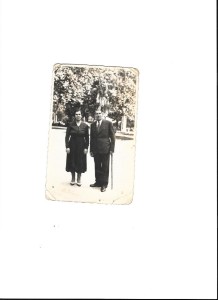
His school certificate, at the age of 12 years, with a “good” mark.
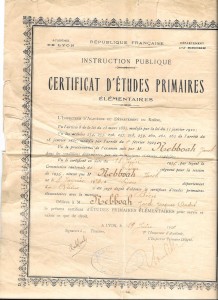
His diploma from trade school.
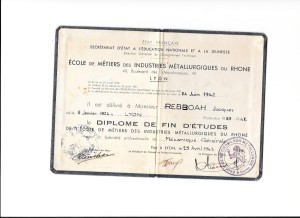
[1] See document #7, death certificate
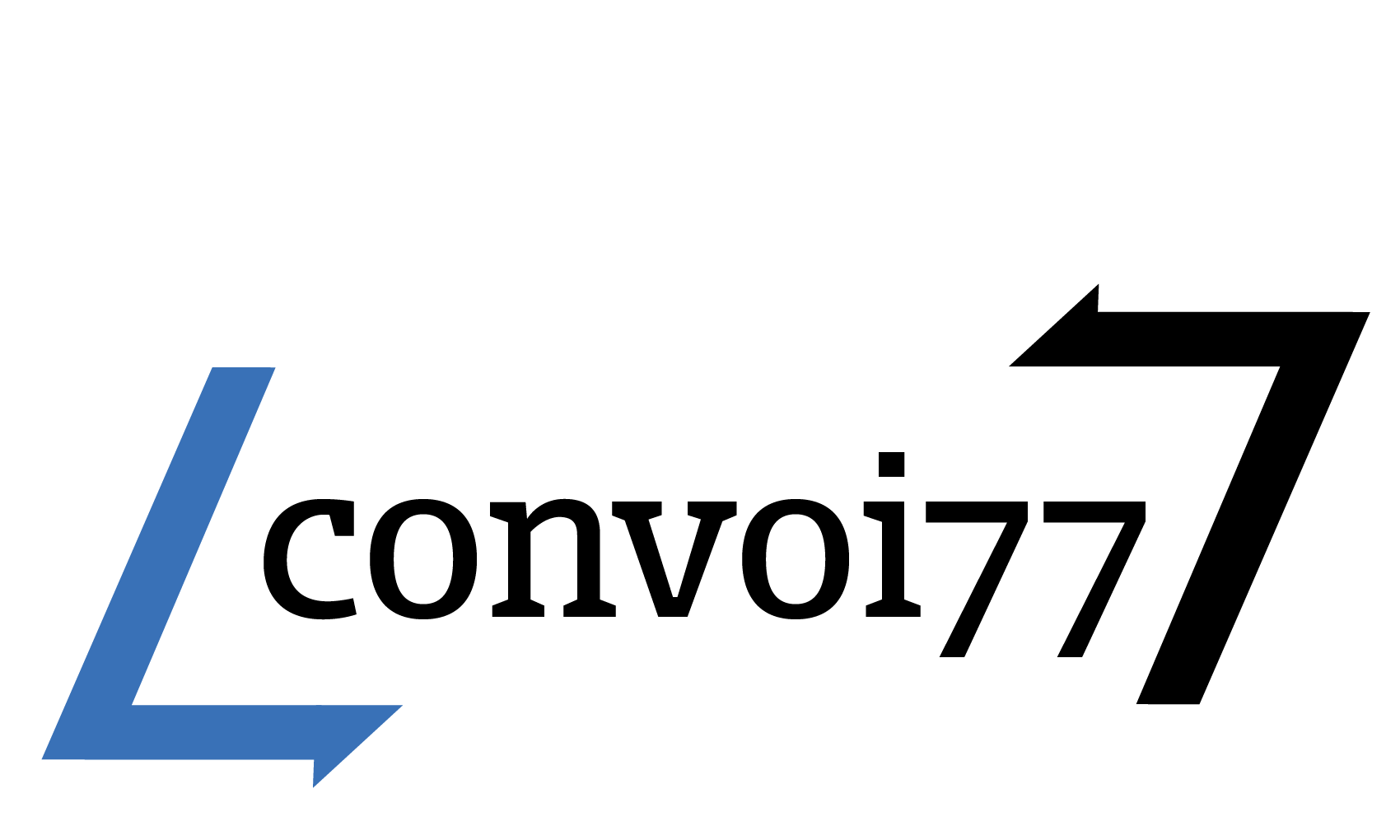

 Français
Français Polski
Polski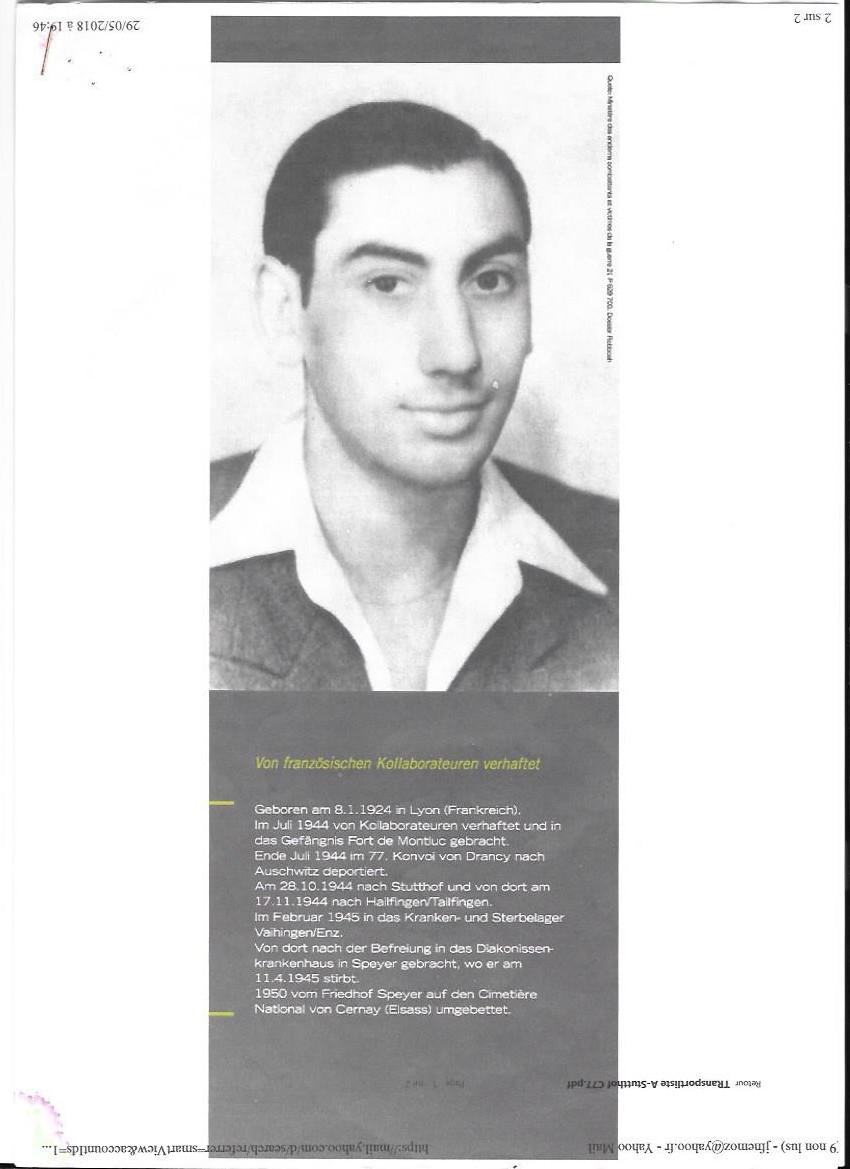











Merci pour ce témoignage de l’un de nos aïeux… Je suis heureuse et triste à la fois… heureuse d’en savoir plus sur le frère de mon grand père chéri Victor, mais triste qu’il n’ait pas eu les réponses aux questions qui l’ont taraudé tout au long de sa vie. Beau travail de recherches merci pour eux, Maurice, Victor, Prosper, Anna, Aaron, et Jacques.
Myriam REBBOAH
Magnifique témoignage fruit d’un travail admirable.
C’est en recherchant sur internet les traces de la famille Rebboah, à la demande de ma mère Jeannine Benaim veuve de Jacques (Jacob) Benaim frère de Anna, que j’ai découvert ce document si éclairant sur cette tragédie qu’evoquait avec émotion Tonton Jacques.
Bravo pour ce travail gigantesque.
Bravo et merci
Bravo ,beau témoignage Mémé Anna toute mon enfance ,Prosper , Mumu ,jean jaques…..